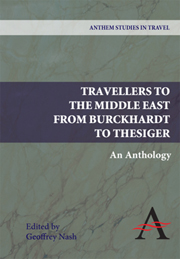Book contents
- Frontmatter
- Contents
- Acknowledgements
- Introduction
- PART ONE THE COMING OF EMPIRE 1800–1879
- PART TWO COLONIALISM AND RESISTANCE 1880–1950
- Ottoman and Former Ottoman Territories
- Arabia
- Persia/Iran
- 1 Persia and the Persian Question
- 2 A Year Amongst the Persians
- 3 Persian Letters
- 4 The Middle East Question
- 5 The Road to Oxiana
- 6 The Cruel Way
- Bibliography
5 - The Road to Oxiana
from Persia/Iran
Published online by Cambridge University Press: 05 March 2012
- Frontmatter
- Contents
- Acknowledgements
- Introduction
- PART ONE THE COMING OF EMPIRE 1800–1879
- PART TWO COLONIALISM AND RESISTANCE 1880–1950
- Ottoman and Former Ottoman Territories
- Arabia
- Persia/Iran
- 1 Persia and the Persian Question
- 2 A Year Amongst the Persians
- 3 Persian Letters
- 4 The Middle East Question
- 5 The Road to Oxiana
- 6 The Cruel Way
- Bibliography
Summary
With Harold Acton, Byron was a key figure in the 1920s Oxford milieu described by Evelyn Waugh in Brideshead Revisited (DNB). He began establishing a reputation as a traveller and writer on Art with Europe in the Looking-Glass (1926), a youthful record of a journey made with two Oxford friends to Germany and Italy. He found himself honoured in Greece owing to his name (he was distantly connected to the poet). To understand Greece better he went to Mt. Athos where he believed the Byzantine spirit still lived on. The Station (1928) and The Byzantine Achievement (1929, repr. 1937) were statements of his belief that, in the words of his friend Christopher Sykes, ‘the Byzantine Empire was the high noon of Hellenic greatness’ (Sykes 1946: 103). According to Sykes, Byron was a ‘fighter’ who could however carry his opinions to extremes, as he did in his condemnation of Roman Catholicism. Byron's travels to the East began with a stint in India in 1929 as a correspondent for the Daily Express. An Essay on India, which appeared in 1931, laid out his ambivalence toward empire and modernity. He criticized the British Raj for its assumption of racial superiority and bitterly attacked Churchill for his opposition to India achieving dominion status, but he also reproved Indians, while acting under an unavoidable sense of inferiority, for attempting to be modern. Byron preferred non-Europeans not to copy Western material success.
- Type
- Chapter
- Information
- Travellers to the Middle EastAn Anthology, pp. 280 - 285Publisher: Anthem PressPrint publication year: 2009



